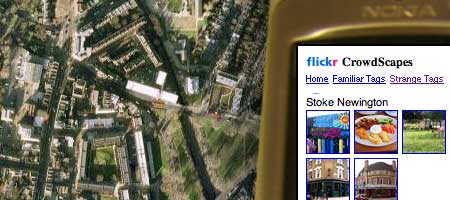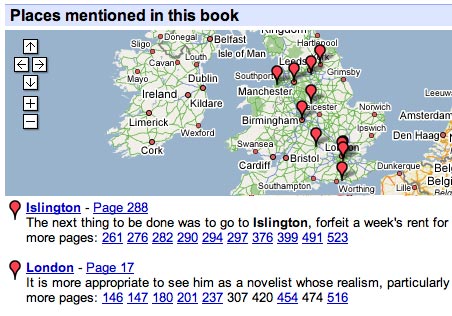An update on some of the locative stuff I’ve been talking about…

I did get that GPS unit, and thanks to quite a lot of Googling I’ve managed to hack it to my laptop to update my location on Google Maps (screenshot above) – which involved teaching myself rudimentary Python and exploiting my new, poor PHP skills. What I did learn was how fun technology on your own terms is; just as we’re moving past the stage of being passive consumers of TV and other media, so we’re taking control of technology at it’s most base level too. But I digress…
In my research, I’ve discovered I’ve been partially beaten to the punch by more professional services. CrowdScapes uses Yahoo’s ZoneTag service to pull in Flickr photos near your location – at the moment it’s limited to Nokia N-series phones in the US, but you can get a taste by hitting “Launch” and entering your location here. It’s pretty cool.

Patrick from mscapers pointed me towards the fascinating stuff that Hewlett Packard are doing with a bunch of UK artists, mostly centred around their research centre in Bristol, from fun locative games like Hidden Danger UXB! which can be played anywhere (providing you’ve got a GPS-enabled HP tablet – anyone?), ‘playable’ guides to specific locations (e.g. The Tower of London), to more meditative experiences like always something somewhere else.
‘always something somewhere else’ is a generative mediascape that creates a temporary map in a location as the user is asked to seek out certain base materials such as glass, stone, and water. As they reach each material they hear the beginning of a fictional narrative about another person in a far off location standing next to the same material. As the map is created the user can return to the points they marked to hear the stories fold in on themselves and conclude.
The associations with storytelling here remind me strongly of earlier, less-tech’d-up locative artworks, particularly the operatic climate-change tour And While London Burns, and Janet Cardiff’s awesome The Missing Voice (which I believe is still available on request from the Whitechapel Gallery, but I’ll double-check). Story-telling is incredibly well-suited to this medium – does anyone have any other examples of such experiments?
For myself, I’m going to keep hacking away – I think I missed a trick not getting a Bluetooth GPS to work with my phone, so that might be the next step. I’m particularly interested in what geocached information we can hack out of Google Book Search:
Literature is inescapably intertwined with our everyday environment. By making this visible, we can encourage and spread it, and send it in new and exciting directions.

We created a Google Earth literary map a while back which you may be interested in viewing. The kmz file can be downloaded here http://www.literarytourism.co.za/index.php?option=com_content&task=view&id=71&Itemid=
Comment by Niall — September 11, 2007 @ 3:29 pm
[…] Literature is inescapably intertwined with our everyday environment. By making this visible, we can encourage and spread it, and send it in new and exciting directions. […]
Pingback by Infovore — September 12, 2007 @ 11:38 am